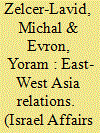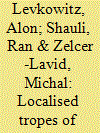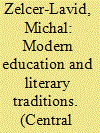| Srl | Item |
| 1 |
ID:
177576


|
|
|
|
|
| Summary/Abstract |
As East-West Asia relations expand and diversify, cross-regional non-state relations develop as well. Surprisingly though, this development has so far been largely overlooked. Attempting to fill this void, this article focuses on the involvement of Japan’s and South Korea’s civil societies in the Israeli-Palestinian conflict. More specifically, it argues that the intensification of cross-regional connections between East Asia and the Middle East generates involvement of the civil society in this conflict, whose specific shape is influenced by the attributes of each state. To test this supposition, the article comparatively examines the civilian protests in Japan and South Korea against Israel and their impact. The article’s contribution is fourfold: it examines the important yet inadequately studied growing civil society participation in East-West Asia relations; it indicates the relatively new interaction between state and non-state actors in East Asia concerning the Middle East; it explores for the first time protest movements against Israel in East Asia; and it enriches existing knowledge about civil society participation in South Korea’s and Japan’s foreign relations with an intriguing yet so far overlooked case.
|
|
|
|
|
|
|
|
|
|
|
|
|
|
|
|
| 2 |
ID:
190053


|
|
|
|
|
| Summary/Abstract |
This article focuses on the ways in which concepts and tropes of the Holocaust are used as political instruments in a part of the world that was not immediately affected by its events. It reviews the use of these concepts in selected cases from areas of political conflict in South Korea, Malaysia, and China and compares them with a view to finding a common denominator specific to these Asian countries. The article questions the futility of the current attempt to regulate definitions of antisemitism and its detachment from the realities of politics and academic and public discourse, especially in Asia. Finally, it demonstrates that the semantics of the Holocaust in the selected cases seldom signify anti-Jewish sentiment but are used for other rhetorical and political purposes.
|
|
|
|
|
|
|
|
|
|
|
|
|
|
|
|
| 3 |
ID:
161355


|
|
|
|
|
| Summary/Abstract |
In 1949, illiteracy among both Uyghurs and Tibetans was similar to that throughout China and estimated as higher than 90%. Since then, the rate of illiteracy in Xinjiang has shrunk considerably, while in Tibet it has remained the highest in China. This gap can explain the difference between the small volume of literature published annually in Tibet and the extensive literature that appears yearly in Xinjiang. A major reason for the high literacy rate and the emergence of a thriving modern literature in Xinjiang is the system of modern education that developed in the region at the start of the twentieth century. In contrast, in Tibet, the religious conservatism of the Buddhist elite prevented the introduction of modern education in order to retain local cultures. The comparison of the influences of modern education on the creation of literary traditions allows us to examine the continuity of Uyghur and Tibetan cultures in the context of contemporary China.
|
|
|
|
|
|
|
|
|
|
|
|
|
|
|
|